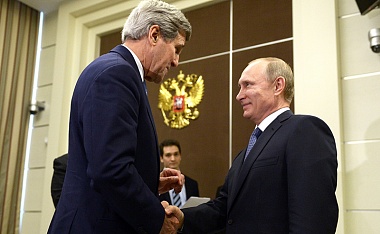
Although John Kerry’s visit to Russia – his first in two years – did not become a breakthrough for Russian-American relations, it represented Washington’s attempt to adjust its policy towards Moscow, according to experts.
“No one expects a considerable improvement in relations between Russia and the United States. On the other hand, the United States has started to pay close attention to Russia’s position after it became clear that isolating Russia was not going to work,” says political scientist Alexei Mukhin.
He noted that after celebrations in Moscow commemorating the 70th anniversary of the victory in World War II, which was attended by a considerable number of world leaders, it became clear that the United States was losing the information war with Russia. “Which is why John Kerry hurried to come to the rescue and, in an attempt to save the face of American diplomacy, asked for a meeting with Sergey Lavrov and Vladimir Putin,” Mukhin told Aktualnye Kommentarii.
Nevertheless, according to the expert, the national interests of the U.S. and Russia remain polarized. “But the fact that at least the process of finding solutions for these conflict situations has begun is a great achievement,” Mukhin said.
Political scientists note that Kerry’s visit became an important event because for the first time in months the dialogue between Washington and Moscow resumed. Before the visit, diplomatic talks were replaced with propagandistic statements. At the same time, observers agree that the significance of the visit of the U.S. secretary of state should not be exaggerated.
“The general tone of our relations with the U.S. has indeed become more considerate, but I wouldn’t say that we have reached any specific progress,” thinks political scientist Evgeny Minchenko.
According to Minchenko, several factors influenced the change in Washington’s course. “The attitude of Europeans towards Russia has changed. The idea of lifting the sanctions is getting popular in Europe now, not the Crimean sanctions but the ones related to the situation in southeastern Ukraine. Americans, of course, would not lift any sanctions but it is important for them to save the face, to show that Europe is still under control,” the political scientist is cited as saying in Russia’s Snob magazine.
Another factor, believes Minchenko, is that the U.S. became disappointed with the new Ukrainian authorities. “Here, the story with Yushchenko repeats itself. First, the U.S. Congress applauded him, but eventually, his regime turned out to be weak and corrupt. The same is happening now. Corruption in Ukraine is not defeated, political violence still exists. No one is going to go into war for Ukraine or sponsor the country. Gradually, the U.S. is beginning to change its trajectory,” the expert says.
An additional factor, according to Minchenko, is the fact that the U.S. “is uneasy because of the rapprochement of Russia and China.”
On May 12, Kerry held talks in Sochi with President Vladimir Putin and Foreign Minister Sergey Lavrov. Many issues were discussed during the four-hour meeting, including resolution of the Ukrainian and Syrian crises, the Iranian nuclear issue, as well as a number of specific topics regarding bilateral relations between Russia and the United States.
After the talks, the Russian president’s press secretary, Dmitry Peskov, said that during the meeting with Putin, Kerry addressed the issue of anti-Russian sanctions. “The topic was not brought up by the Russian side. It is still not on our agenda,” he emphasized.
During a previous press conference, Kerry linked lifting of the U.S. and EU sanctions with the implementation of the Minsk agreement in Ukraine. “If and when the Minsk agreement is fully implemented,” the secretary of state said, “it is clear that the U.S. and EU sanctions can begin to be rolled back.”
In the Kremlin, the communication between Putin and Kerry was seen as a first sign of recognizing the need to return to a partnership between the two countries. This opinion was expressed by the assistant to the Russian president, Yuri Ushakov. “On that basis, we consider the contact that took place as very helpful, useful and positive,” he noted.
According to Aleksey Pushkov, the head of the foreign affairs committee in the State Duma, “The aim of Kerry’s visit was not only to establish a shift in the position of the U.S., but to attempt to partially restore the almost stopped dialogue.” “Naturally, if the U.S. wants to restore the dialogue, it has to consider Russia’s position at least in some way, “TASS cites Pushkov’s response to journalists.
According to the member of the Russian parliament, in this particular case, considering Russia’s position means that “Kerry acknowledges that Kiev does not observe the Minsk agreements … Until recently, Washington claimed that ‘they clearly see Ukraine’s readiness to implement the Minsk agreements,’” the head of the State Duma committee recollected.
Chairman of the Federation Council Valentina Matvyienko considers the meeting between Kerry and Putin and Lavrov a positive step, however she does not see a breakthrough in the relations of the two countries.
According to Matvienko, another positive outcome of the meeting is the question of lifting the sanctions on Russia that was addressed by the U.S. secretary of state. “Unfortunately, the conditions are such that only Russia is held responsible for the implementation of the Minsk agreement,” Matviyenko noted. “We are not a side in the conflict; we only attempt to facilitate the implementation of the Minsk agreement. Kiev authorities bear the responsibility for the events in Ukraine and they should be expected to fully implement the Minsk agreement.”
John Kerry became the most high-profile American to visit Russia since the beginning of the events in Ukraine.

Leave a Reply
You must be logged in to post a comment.